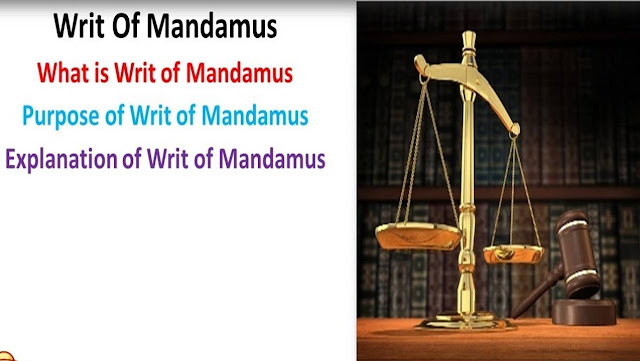What are the Grounds of writ of mandamus?
The writ of mandamus is a court order that compels a public official or organization to perform a legal duty. It is an extraordinary remedy that is only used when there is a clear legal right and a clear legal duty that has been violated.
The grounds for issuing a writ of mandamus are:
• The petitioner must have a clear legal right.
This means that the petitioner must be able to show that they have a legal entitlement to the relief that they are seeking.
• The respondent must have a clear legal duty.
This means that the respondent must be legally obligated to perform the act that is being requested.
• The respondent must have failed to perform their legal duty.
This means that the respondent must have either refused to perform the act, or they must have delayed in performing the act without a legitimate reason.
• The petitioner must have exhausted all other available remedies.
This means that the petitioner must have tried all other possible ways to get the respondent to perform their legal duty before asking the court to issue a writ of mandamus.
In addition to these grounds, the court will also consider the following factors when deciding whether to issue a writ of mandamus:
• The public interest.
The court will consider whether issuing a writ of mandamus would serve the public interest.
• The balance of convenience.
The court will consider whether the benefits of issuing a writ of mandamus outweigh the costs.
• The likelihood of success.
The court will consider whether the petitioner is likely to succeed on the merits of their case.
If the court finds that all of the grounds for issuing a writ of mandamus are met, it will issue the writ and order the respondent to perform their legal duty. The respondent is then legally obligated to comply with the order of the court.
Here are some examples of cases where a writ of mandamus might be issued:
• A petitioner who has been denied a government benefit that they are legally entitled to receive.
• A petitioner who has been denied a fair hearing by a government agency.
• A petitioner who has been denied access to public records.
• A petitioner who has been denied due process of law by a government official.
The writ of mandamus is a powerful tool that can be used to protect the rights of individuals and ensure that the government complies with the law. However, it is an extraordinary remedy that should only be used in cases where there is a clear legal right and a clear legal duty that has been violated.
There're some FAQs about the writ of mandamus:
• What is a writ of mandamus?
A writ of mandamus is a court order that compels a public official or organization to perform a legal duty. It is an extraordinary remedy that is only used when there is a clear legal right and a clear legal duty that has been violated.
• Who can file a writ of mandamus?
Any person who has been harmed by the failure of a public official or organization to perform a legal duty can file a writ of mandamus. This includes individuals, businesses, and organizations.
• What are the grounds for issuing a writ of mandamus?
The grounds for issuing a writ of mandamus are:
* The petitioner must have a clear legal right. This means that the petitioner must be able to show that they have a legal entitlement to the relief that they are seeking. * The respondent must have a clear legal duty. This means that the respondent must be legally obligated to perform the act that is being requested. * The respondent must have failed to perform their legal duty. This means that the respondent must have either refused to perform the act, or they must have delayed in performing the act without a legitimate reason. * The petitioner must have exhausted all other available remedies. This means that the petitioner must have tried all other possible ways to get the respondent to perform their legal duty before asking the court to issue a writ of mandamus.
• What are the factors that a court will consider when deciding whether to issue a writ of mandamus?
In addition to the grounds for issuing a writ of mandamus, the court will also consider the following factors when deciding whether to issue the writ:
* The public interest.
The court will consider whether issuing a writ of mandamus would serve the public interest.
* The balance of convenience.
The court will consider whether the benefits of issuing a writ of mandamus outweigh the costs.
* The likelihood of success.
The court will consider whether the petitioner is likely to succeed on the merits of their case.
• What is the process for filing a writ of mandamus?
The process for filing a writ of mandamus will vary depending on the jurisdiction. However, in general, the petitioner will need to file a petition with the court, along with supporting documents. The petition will need to state the grounds for the writ and why the petitioner believes that the writ should be issued. The respondent will then have an opportunity to respond to the petition. After the respondent has responded, the court will decide whether to issue the writ.
• What are the consequences of not complying with a writ of mandamus?
If a respondent fails to comply with a writ of mandamus, they may be held in contempt of court. Contempt of court is a serious offense that can result in fines, imprisonment, or both.

